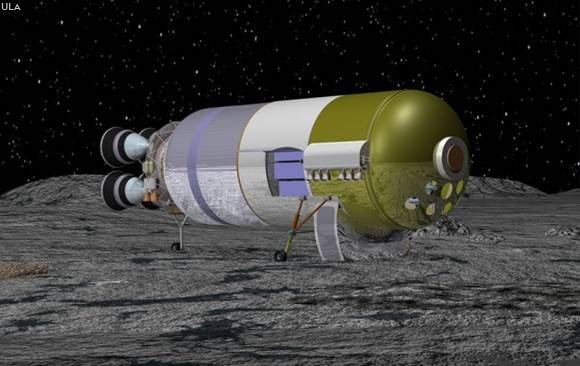 |
| The Crewed United Launch Alliance DTAL (Dual Thrust Axis Lander), as proposed in 2010 [ULA]. |
Doug Conway
The Australian/AAP
When mankind colonizes the moon, it's likely to be led by a commercial enterprise rather than a government. So says NASA administrator Charles Bolden, who believes nations will no longer venture into space alone, but in collaboration with each other and with private industry.
Maj-Gen Bolden, who flew into orbit four times on the US space shuttle program which ended last year, says governments will lead the way in space exploration, but not in getting access to space.
"We have now got to the point where NASA should have nothing to do with it (access to space)," he said in an address today at Sydney University.
"We have run the tests, we have been flying for 50 years, we know basically how to get humans off the planet and into low-earth orbit. Our private industry partners have built every single space craft we have ever flown.
"NASA has never built a single human-rated space craft."
The Australian/AAP
When mankind colonizes the moon, it's likely to be led by a commercial enterprise rather than a government. So says NASA administrator Charles Bolden, who believes nations will no longer venture into space alone, but in collaboration with each other and with private industry.
Maj-Gen Bolden, who flew into orbit four times on the US space shuttle program which ended last year, says governments will lead the way in space exploration, but not in getting access to space.
"We have now got to the point where NASA should have nothing to do with it (access to space)," he said in an address today at Sydney University.
"We have run the tests, we have been flying for 50 years, we know basically how to get humans off the planet and into low-earth orbit. Our private industry partners have built every single space craft we have ever flown.
"NASA has never built a single human-rated space craft."
Read the article HERE.

3 comments:
This is really disappointing! It shouldn't be an either/or situation.
Making lunar operations commercially viable requires risking a lot of up-front capital before you can start returning profit. For commercial ventures that's too much risk. But NASA could use lunar polar-derived water at L1 or LEO for its own BEO operations. So the solution is for NASA to do a "Lunar COTS" and guarantee to purchase a certain amount of lunar water at L1 and LEO. This will reassure the commercial ventures and get them to invest their own money since the inital return is contractual. After having supported the initial infrastructure build-up, NASA can transition out while the new cis-lunar market takes hold but still purching orbital fuel from the commercial ventures at the lowest cost.
True, there will first be a small manned private lunar base whose purpose is to repair teleoperated robots and to exploit regolith to make simple but bulky telerobotic parts. That base could serve as the basis for a colony. But again, NASA has a place to play there because of the biomedical and other science research that could be done from the base/colony as well as being a customer for the colony's metals, glass, ceramics, etc.
Finally, I am not convinced that the commercial loss of life will set operations back further than if the life lost was that of a government employee.
I agree with Anonymous. The start-up financial risk is just too great. NASA needs to provide the initial funding to get things close to profitable.
Please go to LunarCOTS.com and sign the petition calling for exactly this sort of thing.
If the start-up risk is too great, then maybe there is a good reason to invest scarce resources elsewhere for the time being. Perhaps building up the necessary technologies to make it worth the risk first and eliminating more of the risk? If there is a way to bring value to a consumer, there is an entrepreneur who will find that way. Using the state to "prime the pump" is just a euphemism for socializing the financial risk (stealing the funding from you and me) and privatizing any profit from the endevour.
Bureaucrats will go along with anything you tell them to spend money on and create nearly perpetual make-work projects to keep their constituencies happy; why should they care, it's not their money, it's ours! Remember, Apollo wasn't about Moon geology...that was a secondary afterthought that the geologists had to remind Government about (see Shoemaker's thoughts on the subject http://www.vectorsite.net/tamrc_24.html). Or how about a history of Apollo to Constellation; a constant mismash of make-work projects and DoD black ops? http://www.thenewatlantis.com/publications/a-space-program-for-the-rest-of-us
The politicians sell us "human exploration" and what we actually end up being forced to purchase (through taxation and inflation) is weapon creation and jobs programs.
No, if we go anywhere, I don't want the state stealing my money and my future to do it. I want a group of individuals with a solid plan they are willing to bet their lives on. A plan to make use of those new natural resources, to do it on their own dime and to absorb the risk and reward on their own.
Post a Comment